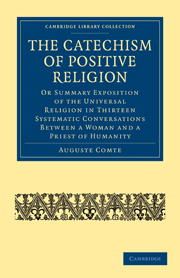 The Catechism of Positive Religion
The Catechism of Positive Religion Book contents
- Frontmatter
- PREFATORY NOTE TO THIRD EDITTON
- Contents
- PREFACE
- POSITIVIST LIBRARY
- HINT TO THE READER
- INTRODUCTION
- First Part EXPLANATION OF THE WORSHIP
- Second Part EXPLANATION OF THE DOCTRINE
- Third Part EXPLANATION OF THE REGIME, OR SYSTEM OF LIFE
- CONCLUSION: GENERAL HISTORY OF RELIGION
- CONVERSATION XII The Fetichist and Theocratic period common to all Peoples
- CONVERSATION XIII The Transition of the West
- TABLES
CONVERSATION XII - The Fetichist and Theocratic period common to all Peoples
Published online by Cambridge University Press: 05 October 2010
- Frontmatter
- PREFATORY NOTE TO THIRD EDITTON
- Contents
- PREFACE
- POSITIVIST LIBRARY
- HINT TO THE READER
- INTRODUCTION
- First Part EXPLANATION OF THE WORSHIP
- Second Part EXPLANATION OF THE DOCTRINE
- Third Part EXPLANATION OF THE REGIME, OR SYSTEM OF LIFE
- CONCLUSION: GENERAL HISTORY OF RELIGION
- CONVERSATION XII The Fetichist and Theocratic period common to all Peoples
- CONVERSATION XIII The Transition of the West
- TABLES
Summary
The Woman.—These last conversations have a strong antecedent attraction for me, my dear father, from the want I have often felt of such an historical complement of the triple exposition you have just completed. I have already understood, in many cases, that the final state regulated by the Religion of Humanity had always to be preceded by a long and difficult initiation, especially indispensable to every original evolution. But these partial glimpses excite, rather than satisfy, my desire to know the outlines of the historical theory which enables you to appreciate the past, so as to determine the future, with a view to clearly delineate the present.
The Priest.—Its main foundation, my dear daughter, is in the two laws of mental evolution with which you are now familiar. You already know how there follows from them the general division of the preparation of man, begun by fetichism, carried on by polytheism, and completed under monotheism. However, before we proceed further, you must for a short time return on this fundamental principle, to convince yourself in regard to it that the course which at first seemed merely inevitable was really indispensable.
Attend particularly to the intellectual necessity of such an initiation, as it is less understood than any other. If every true theory necessarily rests on observed facts, it is not less certain that any connected observation demands a theory.
- Type
- Chapter
- Information
- The Catechism of Positive ReligionOr Summary Exposition of the Universal Religion in Thirteen Systematic Conversations between a Woman and a Priest of Humanity, pp. 255 - 269Publisher: Cambridge University PressPrint publication year: 2009First published in: 1891


